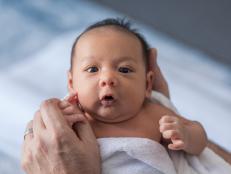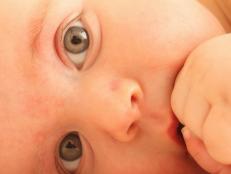New Study Says Children Who Don’t Eat Eggs Before Their First Birthday Are More Likely to Develop an Egg Allergy
Here’s why you can add eggs to your little one's breakfast plate.


MartinPrescott
Introducing new foods to your baby is exciting, but it can also be really stressful for parents. With the guidelines for which foods are safe to introduce to infants seeing a major overhaul, parents may feel that exclusively offering "safe" food to their baby is the way to go. However, new research may have you thinking twice about skipping some foods that kids may be allergic to, like eggs.
According to a new study from the American College of Allergy, Asthma, and Immunology, early introduction to eggs can decrease an egg allergy in children. While parents were often told to avoid eggs before a baby is one, this new study changes those outdated feeding guidelines. This information is similar to the studies done on peanuts that changed the feeding guidelines for peanut products and infants. In 2017, pediatricians began telling parents to offer peanut butter or peanut flavored snacks early on to avoid a peanut allergy.
For this study, researchers examined infant feedings and food allergies from over 2,200 children. The research started when the babies were infants and concluded when they were six years old. The researchers found that the children who did not eat eggs before their first birthday were more likely to have an egg allergy by age six.
"Egg allergy is the second most common food allergy throughout the world," said Xiaozhong Wen, MD, PhD, who is the senior author of the study. "Current evidence suggests that early introduction of egg during infancy, followed by consistent and frequent feedings, seems protective against development of egg allergy. We are still investigating optimal timing of infant egg introduction and frequency of feeding."
Not only are eggs a great source of protein for your baby, but eggs also contain important nutrients for little ones, like riboflavin, choline, B12, and folate. From scrambled eggs for breakfast to slices of hard boiled eggs for lunch, there are plenty of ways to feed your baby eggs.
If you still feel nervous about offering eggs to your little one, here are the signs to watch out for in case of an allergic reaction: hives, rashes, shortness of breath, itchy and red eyes, nausea, and vomiting. Symptoms can be mild to severe and appear within minutes to hours of eating eggs.
Obviously, if you see any of these signs, call your pediatrician right away or call 911 if it's an emergency.
YOU MIGHT ALSO LIKE:















